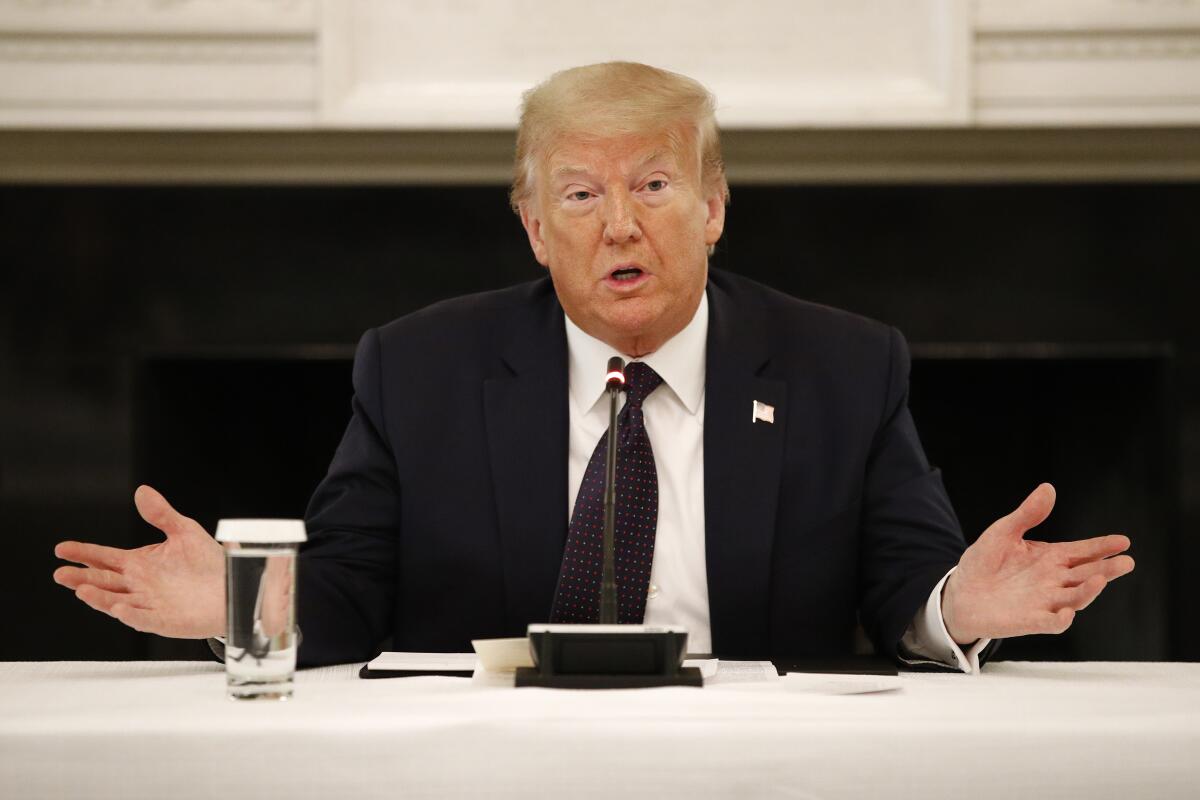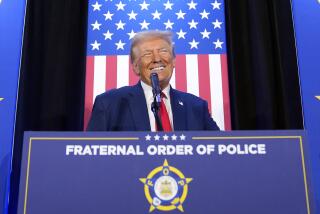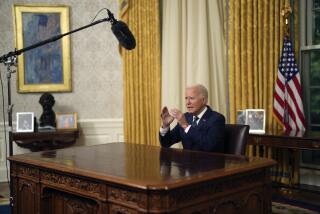Biden, Trump take opposing stands: One visits George Floyd family; the other meets with police

- Share via
WASHINGTON — As Joe Biden stood with the family of George Floyd on Monday in demanding police accountability, President Trump made clear where he stands, meeting with law enforcement officers and accusing Biden of undermining public safety.
Much of the nation is also taking a position, and a raft of recent polls indicate that it is not with Trump. The president finds himself with some of his lowest approval ratings since moving to the White House, facing an electorate that has swung sharply toward the belief that racism remains prevalent in America’s police departments — a view Trump said he rejects.
“Our police have been letting us live in peace, and we want to make sure we don’t have any bad actors in there, and sometimes we’ll see some horrible things like we witnessed recently, but I say 99.9 — let’s go with 99% of them — great, great people, and they’ve done jobs that are record-setting,” Trump said during a meeting Monday with police officials.
Biden, by contrast, spent an hour in Houston in a private meeting sharing the grief of the family of Floyd, the black man choked to death by a Minneapolis police officer two weeks ago — a videotaped killing that set off a wave of nationwide protest. Floyd’s funeral is planned for Tuesday.
“He listened, heard their pain and shared in their woe,” Benjamin Crump, the family’s lawyer said in a statement on Twitter. “That compassion meant the world to this grieving family.”
The contrasting scenes reinforced the messages of the two campaigns.
For the African American and liberal white voters on whom Democrats depend, Floyd’s killing has pushed far-reaching change in the nation’s police high on the national agenda.
By contrast, Trump’s conservative white followers consistently tell pollsters they do not believe police systemically treat African Americans unfairly.
In the aftermath of Floyd’s death, public opinion has shifted strongly against that view. About two-thirds of Americans say black and white people do not receive equal treatment from the police, according to a Yahoo News/YouGov poll conducted as protests erupted. That’s up sharply from 38% in a 2015 YouGov survey. Several other recent polls have shown similar shifts.
Trump hopes to move the debate back in his direction by portraying Democrats as “radicals” intent on abolishing police departments.
On Monday, Biden and fellow Democrats found themselves carefully navigating around calls by activists to “defund” and “disband” police departments, which some Democrats worry could give Trump a fresh opening to drive a wedge between them and voters.
“This is where danger lurks for Biden,” said Ruy Teixeira, a political demographer at the liberal Center for American Progress. “People want to see the police do better, and they believe the complaints are justified. But people don’t hate the police. They don’t want to defund their local police departments.”
In practice, defunding proposals are more about re-imagining, rather than retreating from, policing. The Minneapolis City Council, for example, could vote this week on a disbanding proposal that calls for replacing the city’s current police department with a community-based public safety system.
Camden, N.J., disbanded its police force in 2013 and replaced it with a countywide force. More recently, other cities have undertaken incremental initiatives to cut their police budgets and reinvest more in the black community.
Los Angeles Mayor Eric Garcetti last week pledged that the city would find $250 million in cuts to “invest in jobs, in health, in education and in healing,” especially in communities of color. He said the cuts would include at least $100 million from the Los Angeles Police Department, which grew rapidly during the last two decades.
Although voters believe police departments need reform, when asked if they support defunding departments, the answer is a resounding “no.” The Yahoo News/YouGov poll for example, found that only 16% of voters wanted to cut funding for police departments.
Trump is now relentlessly painting Biden as champion of the defund movement.
“There won’t be defunding,” Trump said during his Monday event at the White House, at which he signaled openness to incremental reforms on standards for training and use of force. “There won’t be dismantling of our police. There’s not going to be any disbanding of our police.”
Biden supporters think it will be hard for Trump to portray him as a fringe radical.
In an interview Monday on CBS, Biden said, “No, I don’t support defunding the police. I support conditioning federal aid to police based on whether or not they meet certain standards of decency and honorableness and, in fact, are able to demonstrate they can protect the community and everybody in the community.
“What’s happening here is one of those great inflection points in American history, for real, in terms of civil liberties, civil rights and just treating people with dignity,” he said.
Steve Phillips, founder and podcast host at Democracy in Color, an advocacy group focused on empowering minority voters, offered a cautionary note. “It’s a near-historic moment, and you don’t want to miss it and be behind the trend,” he said. “Cities are moving forward with this. Biden does not want to be seen as out of touch.
“There is a way to speak to this that does not fall into the conservative trap,” Phillips said.
The Trump campaign, badly in need of a lifeline amid plunging poll numbers, sees an opportunity.
“It’s clear the protests have broad public support, but the idea of defunding police is not going to play well in the places that matter to us,” said a person involved in the reelection effort, who spoke about the state of the campaign on the condition of anonymity.
“This is a gift for us when we really need one. Democrats are talking about firing cops instead of 40 million Americans being out of work.”
Aligning Biden with “radicals,” the person said, could enable the campaign to regain lost ground with white voters.
So far, however, that effort has failed to take off, in part because the public has become much more receptive to the argument that police violence goes beyond just the few “bad actors” Trump blamed and requires a systemwide response.
“In the past, people felt police were not exerting racial bias, and that these incidents people were protesting about were tragic but isolated,” said Emily Ekins, director of polling at the Cato Institute, a libertarian-leaning think tank that advocates criminal justice reform. “People did not think there was a systemic problem that needed to be addressed. Those assumptions are changing.”
That leaves voters open to some aggressive and innovative reforms, Ekins said. But she cautioned that defunding and disbanding police departments do not appear to be among them.
Biden supporters say the polling trends are a clear indication that the former vice president’s style in meeting this moment is playing well with voters.
“Clearly people are gravitating toward what he has been doing in terms of demonstrating and modeling what real leadership looks like, what a healing message looks like,” said Karen Finney, who was an advisor to 2016 Democratic presidential nominee Hillary Clinton.
Yet the goodwill of voters could dissipate if Biden is perceived as embracing changes to the criminal justice system that go too far, some Democrats warn.
“Just because Trump’s strategy has not worked so far does not mean it won’t work in the future,” said Teixeira. “It depends on how things evolve. If Democrats are not clear that they do not support defunding the police, that is going to help him.”
Times staff writers Noah Bierman and Eli Stokols contributed to this report.
More to Read
Get the L.A. Times Politics newsletter
Deeply reported insights into legislation, politics and policy from Sacramento, Washington and beyond. In your inbox three times per week.
You may occasionally receive promotional content from the Los Angeles Times.











